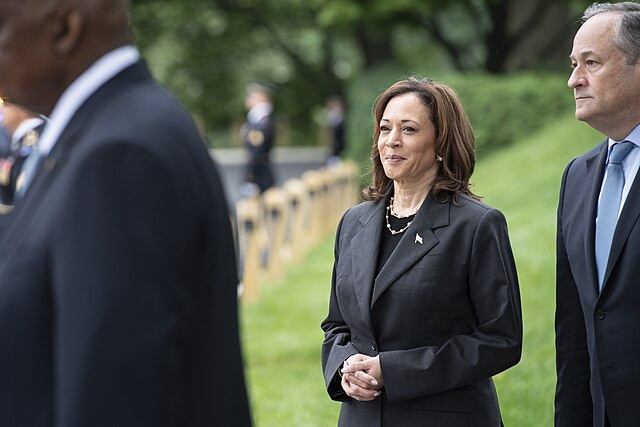Vice President Kamala Harris is making an aggressive push to challenge Donald Trump on immigration, a key issue in the upcoming 2024 election. On Friday, Harris made her first trip as the Democratic nominee to the U.S.-Mexico border, specifically to Douglas, Arizona, a critical swing state. During her visit, she sought to undermine Trump's dominance on the issue by laying out her plans for border security and accusing Trump of derailing bipartisan efforts to reform immigration.
In her speech, Harris took aim at Trump for blocking a border security bill earlier this year, a bill that she said had received backing from both Republicans and Democrats, as well as the Border Patrol union. "It was the strongest border security bill we have seen in decades," Harris told the crowd. "But Donald Trump tanked it. He prefers to run on a problem instead of fixing it." Her remarks were some of the clearest policy proposals she has made on immigration, attempting to shift the narrative by highlighting her experience as California's attorney general to bolster her credentials in dealing with immigration enforcement.
Trump responded to Harris' visit by doubling down on his tough stance on immigration, accusing her of failing to secure the border. At a rally in Michigan, he claimed, "Kamala Harris delivered these horrors," pointing to violent crimes committed by undocumented immigrants. He further accused Harris of having "blood on her hands," continuing his long-standing strategy of linking immigration issues with crime.
For Harris, immigration is a political vulnerability. A recent CNN poll showed that 49% of likely voters trust Trump more than Harris on handling immigration, with only 35% favoring Harris. This gap underscores the challenge Harris faces in convincing voters that she can effectively address the issue, a challenge that became even more evident as she outlined her plans during her Arizona visit. Among her proposals were strengthening asylum restrictions and creating pathways to citizenship for undocumented immigrants brought to the U.S. as children. "They are American in every way," she said, "but still, they do not have an earned pathway to citizenship."
Trump, however, has maintained a commanding lead on immigration, a cornerstone of his political identity since his first campaign in 2016. He has repeatedly emphasized his intention to complete the border wall and enact strict immigration enforcement measures, including a massive deportation plan. During his Michigan rally, Trump echoed these promises, telling supporters that Harris "wants open borders" and accusing her of enabling the influx of undocumented immigrants.
The issue of immigration has also become a flashpoint in other battleground states. Harris' speech came at a time when both campaigns are vying for attention amid a host of national crises, including the aftermath of Hurricane Helene and escalating violence in the Middle East. Despite these distractions, immigration remains central to the political discourse, particularly in swing states where the outcome of the election could be determined by voter attitudes toward border security.
Harris' focus on immigration also comes as the Biden administration faces mounting criticism from both sides of the political aisle. Republicans have long accused the administration of being too lenient on immigration, while some Democrats have pushed back on recent measures that they say have restricted asylum access too much. Harris, in her Arizona speech, sought to walk a fine line between showing toughness on border security and maintaining the Democratic Party's commitment to a more humane immigration system.
During her speech, Harris highlighted her record as California's attorney general, where she focused on prosecuting transnational criminal organizations and worked with law enforcement officials to address gang activity related to drug trafficking. She emphasized her commitment to stopping criminal organizations from exploiting the immigration system, saying, "Stopping transnational criminal organizations and strengthening our border is not new to me, and it is a long-standing priority of mine."
Trump has seized on immigration as one of his key issues in the 2024 campaign, and his rhetoric continues to focus on the dangers of illegal immigration. In Michigan, he claimed that Harris and the Biden administration had allowed undocumented immigrants to flood the country, bringing crime and drugs with them. Trump also reiterated his false claim that Democrats allow undocumented immigrants into the U.S. in order to gain votes, even though non-citizens are not allowed to vote in U.S. elections.
Despite the heated rhetoric, Harris pointed to recent statistics showing that illegal border crossings have declined to their lowest levels since 2020. She credited executive actions that have curbed asylum access and increased border enforcement for the improvement, contrasting her administration's approach with Trump's, whom she accused of failing to pass meaningful immigration reform during his presidency.
The immigration debate is likely to intensify as the 2024 election approaches. Both Harris and Trump are seeking to galvanize their bases with strong stances on the issue, while also appealing to swing voters in key states like Arizona, Georgia, and North Carolina. Harris' strategy appears to be aimed at softening Trump's advantage on immigration while presenting herself as a candidate who can balance toughness with compassion.






